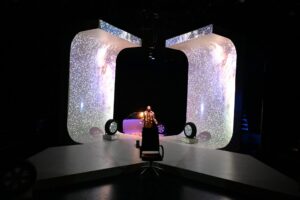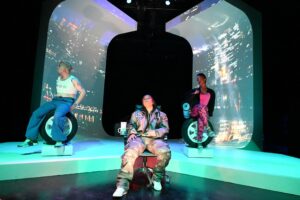Dirty White Teslas Make Me Sad
Ashley Smiley
Magic Theatre (with Campo Santo)

In a week when San Franciscans hear the news of yet another landmark institution about to close its doors for good – Macy’s on Union Square – and when the Chronicle columnist Carl Nolte’s Sunday column is titled “We’re Losing San Francisco Bit by Bit, Aren’t We,” Magic Theatre in union with Campo Santo premieres a powerful, punch-in-the-gut play about the sweeping changes hitting the City and the especially devastating effects on an ever-dwindling Black population. Ashley Smiley’s commissioned Dirty White Teslas Make Me Sad is a poetic, surreal, high tech, street-smart collage that combines the upheaving impact on one family forced to move from their Hunter’s Point home with the futuristic scenario of a tech-driven protest against the regentrification of San Francisco.
Even with degrees under her belt, twenty-something Naima now spends most of her time as an Uber/Lyft driver who is desperately seeking who she is and how she can stay in the City she loves but in many ways no longer recognizes. She sometimes tries talking to God to discover what is in store for her (“I heard you had a plan and not to rush the architect but, can a kid get a peek at the blueprints?”). Other times, she just pops one and maybe more “little mellow pills” to help her anxiety. After all, her car keeps getting its windshield busted – the latest time, even when she is in the car – and Moms nags her to buy moving boxes because they have to leave the City due to rising costs. She personally has no intention of leaving the City or probably even buying the boxes. Needless to say, things are tense at home; and she mostly tries to avoid much conversation or time there.

Anna Marie Sharpe is exceptional in the role of a young woman who moves through her life in what seems almost like she is sleepwalking in a dreamscape that she seems to fear is turning into a nightmare. All she sees around her are “anonymous faces that somehow are able to dictate the future of this City … completely disregarding the past.” Nothing is more symbolic of the disgust she has for these intruding newcomers who drive their ever-present white Teslas around dirty. “To have something that screams … classism and capitalism and not even have to worry about it being clean” is the worst of insults to Naima.

Moms, known to everyone else as Delcina, is frustrated to the hilt with a daughter that is not meeting the potential she thinks Naima has and is continuing to ignore that in three days, they will be moving across the Bay to Oakland. Tanika Baptiste’s Delcina is a powerhouse of a strong woman who never tiptoes into a room but moves with determination and near stomps. She is at a near impasse with the daughter she clearly loves so much, but she cannot help but explode in a tirade when Naima does not do something as simple as buy some boxes. Delcina has also had it with the City that “I know … better than my own hands … My veins are a map of bus lines changing over time.” Speaking with the passion of an orator on the corner of Market and Powell, she decries “the redevelopment vulture capitalists” whose proposal to buy her house is “pure compost like the shit coming out of your mouth.”

Delcina’s brother, Pappadeaux (Juan Manuel Amador) is the “Unc” to whom Naima can turn both for some non-judgmental understanding as well as the resources to fix her latest broken car window. But Unc is tired of her draining his auto repair shop of its window glass and his pocketbook of cash to help his niece, and he thus has a proposal of a better-paying job as a driver for some unnamed project.

Naima jumps at the opportunity to earn more, needed cash and soon finds herself interfacing with a quartet of techy folk whose talk is of the street and who carry names that seem meant to hide true identities. Caesar (Lauren Andrei Garcia) appears to be the group’s leader taking instructions from her uncle. Brüt (Jessica Maria Recinos) works on coding with an Apple always at hand. KoldKutz (Guillermo Yiyo Ornelas) and Baby Gurl (Jamella Cross) are also somehow a part of this plan that involves white Tesslas and that seems to have – according to Pappadeaux – the goal “to shake this City out of its metaverse delusion.” As she assumes her own code name of Sloosh, Naima finds herself in the midst of a futuristic, Black-conceived, Black-run plan that appears to be a reaction against a City that no longer is one where Blacks can exist.

The surreal and mysterious nature of “the plan” and the role of the ever-present Teslas on the streets of the ‘new’ San Francisco is accentuated by the two tall, sleek, white panels with curved tops that couch the stage – panels that melt into a white, raised platform serving as the stage’s floor. The striking, panel setting designed by Tanya Orellana becomes the screen for projections designed by Joan Osato that catalogue the streets traveled by Naima in her car – streets, signs, scenes, passers-by, and even her Uber passengers whose images and sometimes colors are often distorted and/or elongated, adding to the mixture of reality and dream that the play becomes. Her car is a combination of a desk chair and of car tires on wheels, adding much flexibility and possibility to the two dozen scenes of the eighty-minute (no intermission) show. Costumes designed by Afasta the Artist are both of the everyday sort as well as those that speak in color, pattern, and type of street-and-style-smart.
Raelle Myrick Hodges directs the mixture of poetic soliloquies, oft-hard-hitting dialogues and diatribes, and sometimes-near-incomprehensible references and language with a pace quick and with a flow seamless. Ashley Smiley’s script is one that requires leaning in to follow what is exactly happening at times; and there are a number of occasions that one just has to let go of completely understanding what is happening – especially as ‘the plan’ itself unfolds. Particularly confounding is the abrupt, climatic end.
Having said that, Dirty White Teslas Make Me Sad is a brassy, bold declaration of one slice of what is happening within San Francisco today – a love story to a City much adored while at the same time, a tragedy of its current projection and especially on the effect on its Black residents. Congratulations to Ashley Smiley for this first venture onto a major stage and to Magic Theatre and Campo Santo for taking the risk to commission a new, extremely timely and daring new work.
Rating: 4 E
Dirty White Teslas Make Me Sad continues through March 17, 2024, in world-premiere production by Magic Theatre in union with Campo Santo at Magic’s stage, Fort Mason Center for Arts and Culture, 2 Marina Blvd., Landmark Building D, 3rd Floor, San Francisco. Tickets are available online at https://magictheatre.org , by calling 415-441-8822, or by emailing boxoffice@magictheatre.org.
Photo Credits: Jay Yamada
